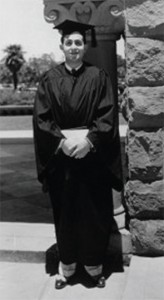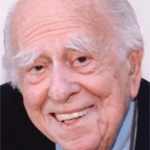He had perfect pitch, which, according to Dr. Engleman, helped him secure his rheumatology fellowship. In My Century, he reported that in 1940 he had applied for a fellowship with rheumatology pioneer Walter Bauer, MD, at Massachusetts General Hospital. Rheumatology was a very new field at the time, and the competition to work with Dr. Bauer was “fierce,” Dr. Engleman recalled.

Dr. Engleman on his graduation day at Stanford. (photo courtesy of Engleman family)
At a certain point, Dr. Bauer interrupted their interview and invited Dr. Engleman to accompany the rheumatology team on ward rounds. One of the patients encountered on the rounds was a woman in her 60s who had, in addition to arthritis, a “musical” heart murmur. Dr. Bauer was poised to order a phonocardiogram to determine the rate of vibration of the woman’s murmur. Dr. Engleman asked to listen to her murmur through the stethoscope. “Not being shy, I said I didn’t need the machine,” he recounted. He explained that he had perfect pitch and knew that A, the note customarily played by concertmasters before performances to tune the orchestra’s instruments, is at 440 Hz, or 440 vibrations per second. The note sounded by the woman’s musical heart murmur, he surmised, was “sharper than A,” and around 500 vibrations per second.
Dr. Bauer was so impressed that he told Dr. Engleman, “Forget the interview. You’ve got the job.”
“That is how I became a rheumatologist,” Dr. Engleman cheerfully recounted in the first chapter of his memoir.
Helping Grow the Specialty
Dr. Engleman’s fellowship was cut short when the U.S. entered World War II after the bombing of Pearl Harbor by the Japanese. Three months after Dec. 7, 1941, he enlisted in the Army and was assigned to the Army Medical Corps, working first at the Army Air Forces hospital in Fresno and later transferring to Torney General Hospital in Palm Springs, Calif. There, Dr. Engleman served as chief of a 50-bed rheumatic fever center where he had a “unique opportunity to observe rheumatic fever in adults.”
By that time, Dr. Engleman was married to his wife, Jean, and the couple’s first son, Philip, was born in 1944 in Palm Springs. After his discharge from the military, the Englemans moved back to Northern California. He opened a private practice in San Mateo in 1947 and, for many years, was the only trained rheumatologist in that region. Shortly after, he established the first rheumatology clinic at UCSF. David L. Daikh, MD, PhD, director of the Division’s Research Training Program, notes that although Dr. Engleman was first and foremost a clinician, “he understood that advances in the field that would make a difference for patients’ lives would come from basic research in immunology and the pathogenesis of the rheumatic diseases that we see.”
